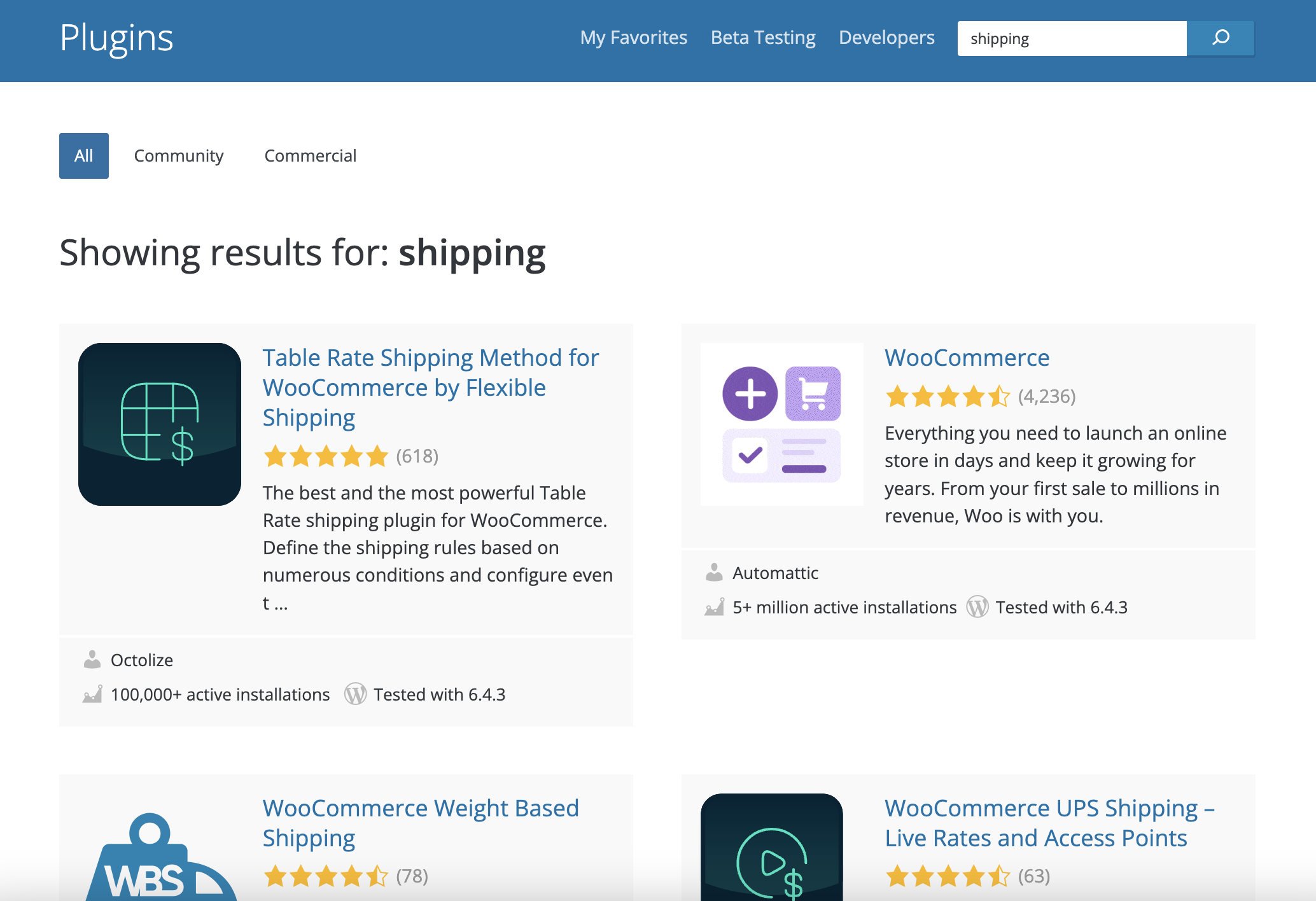
Subscribe to our newsletter

If you’re starting out as a WooCommerce store owner, you recognise the significance of offering your clients a smooth and practical shipping experience. After all, delivery is essential to assuring client happiness and recurring business. But how do you pick the best WooCommerce shipping plugin for your business when there are so many to choose from?
Before we compare the free and premium choices, let’s take a moment to examine the reasons why your WooCommerce business really has to use a dedicated shipping plugin.
WooCommerce, as default, offers just basic shipping configuration options for your store. Shipping plugins extend these options with specific solutions tailored to your needs. They enable you to customise shipping rates, set up complex rules based on factors like weight or location, offer real-time shipping quotes from carriers such as USPS or FedEx, and much more. These are all kinds of options you might need to run your store. WooCommerce is just a foundation for building your store using properly selected plugins. The choices are vast, and in fact, almost any shipping scenario can now be created in a WooCommerce store with the right combination of plugins.
A reliable shipping plugin ensures that store owners can offer various shipping options, which is crucial for customer satisfaction. It allows for automated shipping cost calculations, saving time and reducing errors. Moreover, a good shipping plugin integrates seamlessly with carriers, providing real-time tracking information to the store owner and the customer. This level of transparency builds trust and encourages repeat business. Without a proper shipping plugin, managing deliveries can become a significant bottleneck, hindering the growth and reputation of your online store.
Free WooCommerce shipping plugins offer an accessible entry point for new and small-scale WooCommerce stores looking to streamline their shipping processes without incurring additional costs. You can browse that and add them for free from the official WordPress repository.

These plugins typically provide basic yet essential features and offer a cost-effective solution. They are often just basic versions of plugins whose functionalities can be extended already in premium plugins. These can include restricted access to advanced shipping options, limited support for international shipping, and fewer customisation options. This means that while free plugins can be an excellent starting point, they may only partially accommodate the growing needs of a scaling business. Businesses may need to upgrade to premium versions for more comprehensive features such as detailed shipping analytics, advanced customisation options, and premium support. Therefore, free shipping plugins serve as a valuable tool for businesses to test and implement basic shipping functionalities, but with an understanding that a transition to more robust solutions may be necessary as the business grows.
Transitioning to premium WooCommerce shipping plugins marks a significant step for e-commerce businesses aiming to enhance their shipping capabilities and offer a superior customer experience. Premium plugins distinguish themselves by providing a comprehensive suite of advanced features designed to address growing online stores’ complex and varied needs. With premium offerings, businesses access more comprehensive shipping options, including real-time shipping rate calculations from multiple carriers, rule-based shipping and packaging methods, and seamless integration with international shipping and logistics services. These features streamline the shipping process and enable businesses to offer more flexible and cost-effective shipping solutions to their customers, thereby improving customer satisfaction and loyalty.
Moreover, premium WooCommerce shipping plugins often come with the added benefit of dedicated support and regular updates. This ensures that e-commerce sites remain compatible with the latest WooCommerce updates and shipping industry standards, reducing the risk of disruptions to shipping operations. The investment in a premium plugin often pays dividends regarding operational efficiency, with features like bulk label printing, advanced tracking capabilities, and integration with inventory management systems, saving time and reducing manual errors. Furthermore, the ability to customise shipping solutions according to specific business models and customer needs allows for personalisation and efficiency that free plugins cannot match. As businesses grow and their shipping needs evolve, premium WooCommerce shipping plugins offer the scalability and flexibility necessary to sustain and accelerate that growth, making them a wise investment for serious e-commerce players.
When comparing free and premium WooCommerce shipping plugins, taking a closer look at a specific example, such as Flexible Shipping from Octolize, offers insightful perspectives on the benefits and limitations of each option. The free version of Flexible Shipping provides a solid foundation with essential features like weight-based shipping costs and the ability to set shipping rules based on cart total or weight. This makes it an attractive option for small to medium-sized WooCommerce businesses seeking to implement straightforward shipping strategies without additional expenses. The free version also offers several options regarding free shipping and displays a free shipping progress bar.
Transitioning to the Flexible Shipping PRO version unveils a broader spectrum of advanced features designed for WooCommerce stores with more complex shipping needs. The premium plugin introduces functionality for unlimited shipping methods and rules, including the ability to combine conditions based on weight, cart total, and item count, offering unparalleled flexibility in shipping customisation. Other premium benefits include the option for shipping classes support, which enables differentiated shipping rates for various product categories, and the ability to display estimated delivery dates, significantly improving the customer’s purchasing experience. The Pro version’s dedicated support ensures that potential issues can be swiftly addressed, providing business operations peace of mind and stability. This comparison illustrates that while the accessible version of Flexible Shipping serves as a competent starting point for businesses, the premium version is indispensable for those requiring advanced shipping functionalities and customization to support their growth and enhance customer satisfaction.
If you need more details, see a detailed comparison of the free version with the PRO version.
Now that we’ve explored the pros and cons of both free and premium WooCommerce shipping plugins let’s discuss how you can choose the right one for your store:
If you need more detailed information on this topic, check out our article How to Choose the Right WooCommerce Shipping Plugin.
Selecting the best WooCommerce shipping plugin is an important choice that will directly affect the delivery procedure and customer experience of your shop. Free choices meet basic needs, while paid plugins have more features, carrier integrations, and specialised support. When making this choice, consider your long-term objectives, financial restraints, and company requirements. Wishing you luck!

Dominican Liturgical Center is based in Cracow and focused on promoting the learning of traditional music and singing. They also run a smaller publishing house and a webshop that is focused on selling mainly books and CDs.

Established in 2017. SGL is focused on selling gas bottles and non-gas products. Formerly, the company offered payment by card on delivery. For now, the SGL started online payments and they launched a webstore.